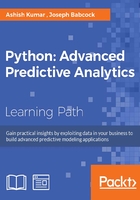
Case 3 – reading data from a URL
Several times, we need to read the data directly from a web URL. This URL might contain the data written in it or might contain a file which has the data. For example, navigate to this website, http://winterolympicsmedals.com/ which lists the medals won by various countries in different sports during the Winter Olympics. Now type the following address in the URL address bar: http://winterolympicsmedals.com/medals.csv.
A CSV file will be downloaded automatically. If you choose to download it manually, saving it and then specifying the directory path for the read_csv method is a time consuming process. Instead, Python allows us to read such files directly from the URL. Apart from the significant saving in time, it is also beneficial to loop over the files when there are many such files to be downloaded and read in.
A simple read_csv statement is required to read the data directly from the URL:
import pandas as pd
medal_data=pd.read_csv('http://winterolympicsmedals.com/medals.csv')
Alternatively, to work with URLs to get data, one can use a couple of Python packages, which we have not used till now, that is csv and urllib. The readers can go to the documentation of the packages to learn more about these packages. It is sufficient to know that csv provides a range of methods to handle the CSV files, while urllib is used to navigate and access information from the URL. Here is how it can be done:
import csv import urllib2 url='http://archive.ics.uci.edu/ml/machine-learning-databases/iris/iris.data' response=urllib2.urlopen(url) cr=csv.reader(response) for rows in cr: print rows
The working of the preceding code snippet can be explained in the following two points:
- The
urlopenmethod of theurllib2library creates a response that can be read in using thereadermethod of thecsvlibrary. - This instance is an iterator and can be iterated over its rows.
The csv module is very helpful in dealing with CSV files. It can be used to read the dataset row by row, or in other words, iterate over the dataset among other things. It can be used to write to CSV files as well.